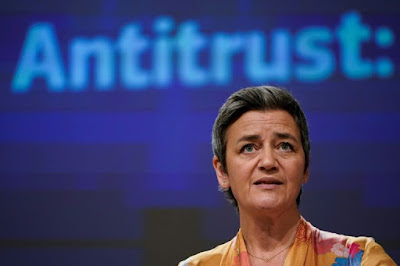Yahoo – AFP,
Catherine KURZAWA with Alex PIGMAN in Brussels, February 12, 2020
 |
.Google and the European Union are to meet in court again in the latest phase
of a legal saga that began a decade ago (AFP Photo/Robyn Beck) |
Luxembourg
(AFP) - Google and the EU battled in court Wednesday as the search engine giant
tried to persuade judges that it was unfairly accused of ill-treating rivals of
its Shopping service.
The Silicon
Valley juggernaut is appealing a 2.4 billion euro ($2.6 billion) fine from 2017
that was the first in a series of major penalties imposed by the European Commission,
the EU's powerful anti-trust regulator.
The court
case launches a new phase in the decade-long duel and is a major test of the
combative tactics taken by the EU commission against big tech.
The next
months will see Google appeal all three decisions that saw Brussels slap a
total $9 billion in EU fines, with the giant's Android mobile operating system
and ad service also caught out for illegal behaviour.
The tech
giant has paid the fines and changed its behaviour, but the company on
Wednesday strongly condemned the EU's verdict on shopping in the EU's General
Court as ill-founded and unfair.
"If
Google would have faced the commission’s decision in 2008, Google would have
had no other option but to abandon its innovative technologies and its improved
designs," Thomas Graf, a lawyer for Google told the EU's General Court.
Supporting
Google, a lawyer for the CCIA tech lobby in Brussels argued that the
Commission's demands "would ultimately harm consumers and internet
users".
'Colossus'
The
Commission's lawyer, Nicholas Khan, deplored the power of the Mountain View,
California giant. "Google's status as the colossus of the digital age is
unquestioned and until recently unquestionable."
The
commission was joined by other plaintiffs, who shot down Google for aggressive
business practices.
 |
EU
competition chief, Margrethe Vestager, quickly became known for her relentless
pursuit of US tech giants that drew attention worldwide (AFP Photo/Kenzo
TRIBOUILLARD)
|
"Google's
behaviour constitutes a serious abuse of dominance which must stop or it will
destroy competition in all the markets in which it decides to enter," said
Thomas Höppner, a lawyer for three companies fighting the group.
The EU and
Google have been locked in battle since 2010 when the commission first looked
into accusations that the search engine was squeezing rivals from results in
order to promote ads and Google Shopping, its price comparison service.
For several
years Brussels and the US giant sought a negotiated settlement, but the EU
abruptly reversed course in 2014 after the intervention of member states and
the arrival of Margrethe Vestager who took over as EU competition chief.
Vestager, a
former Danish finance minister, quickly became known for her relentless pursuit
of US tech giants that drew attention worldwide.
Instead of
negotiation, she repeatedly fined Google and slapped Apple with a 13 billion
euro tax bill that boss Tim Cook dismissed as "political crap".
The appeal
hearing is to last three days with a decision possible by June. The case can
then go to the EU's highest court, the European Court of Justice.
The EU's
case mirrors similar litigation against Microsoft, a legal labyrinth that ran
throughout most of the 1990s and early 2000s and saw the Windows-maker fined
about 1.4 billion euros.
Google was
expected to plead that the commission had wrongly applied arguments used
successfully against Microsoft and that the company has the right to give
advantage to its own services.
The company
would also underline that the EU case erroneously failed to account for the
spectacular rise of Amazon and eBay in its assessment of Google Shopping.
Players in
other sectors are following the case closely, and hoping that Vestager swoops
in on other features such as maps, travel and job ads where Google has yet to
face push back from regulators.
More than
30 travel firms -- including TripAdvisor and Expedia -- wrote to Vestager on Monday
complaining that Google was unfairly trying to enter the vacation rental ad
business.
The EU has
already said it was looking into Google's similar push into job ads.





